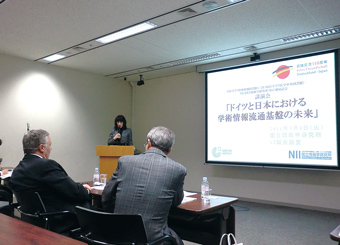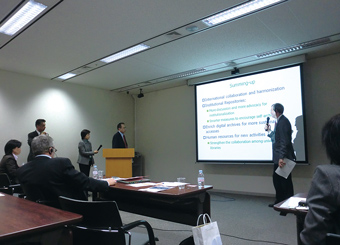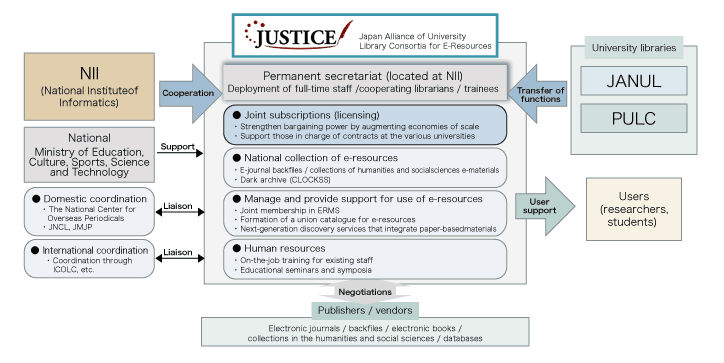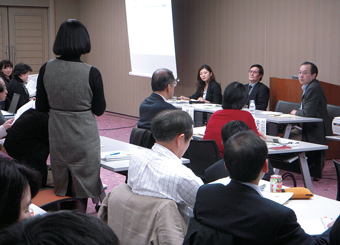
|
||||||||
|
|
||||||||

Nami Hoshiko
(Librarian, Digital Library Section, Information Technology Infrastructure Section, Information Systems Department, Kyushu University)
 Barbara Richter-Ngogang, Head of the Goethe-Institut library, welcomes participants to the symposium and explains its aims.  ZB MED Director Ulrich Korwitz asks a question of Jun Adachi, Director of NII Cyber Science Infrastructure Development Department.
ZB MED Director Ulrich Korwitz asks a question of Jun Adachi, Director of NII Cyber Science Infrastructure Development Department.
On March 8, 2011, three institutions, the German National Library of Science and Technology (Technische Informationsbibliothek, or TIB), the German National Library of Medicine (Deutsche Zentralbibliothek für Medizin, or ZB MED) and the National Institute of Informatics (NII), signed a Memorandum of Understanding (MoU). After the signing ceremony the participants took part in a symposium.1 First, I would like to acknowledge the efforts of the Goethe-Institut in Japan that led up to this memorable event. The idea of German-Japanese cooperation in the area of scholarly communication infrastructure has been nursed since the time Christel Mahnke was head of the library at the Goethe-Institut in Tokyo. The cooperation she had in mind was not just a formal exchange of documents but rather something that would produce tangible results. A study tour of Germany in November 2009 by university librarians and staff members at research institutes in Japan might be the precursor to the present MoU signing.2 More than a year after the tour, Barbara Richter-Ngogang, the new head of the Goethe-Institut library, inherited her predecessor’s vision, and at last it began to take shape. As a member of the study tour, I listened to the symposium with deep emotion with a high regard for all those who contributed to the arrangements. The symposium introduced the current situation of the information infrastructure in Japan and Germany respectively. Ulrich Korwitz, Director of ZB MED, observed that, because of a distinctive feature of the political system, namely, the high degree of independence of each state, there is no central control mechanism in Germany, and funds for research projects tend to be distributed. As a result, institutions in Germany cooperate closely even when they manage information infrastructure. Certainly, projects like National Research Collection System or Electronic Journals Library would be difficult to sustain if each institute did not have its own responsibility. Herr Korwitz also referred to recent trends as intelligent information retrieval techniques, national licensing for electronic materials, open access, the long-term preservation of digital material, and virtual research environments. These topics are all current concerns in Japan as well, and with the signing of the MoU, sharing information with Germany are expected to increase even further. At the beginning of his talk, Uwe Rosemann, Director of TIB, introduced his organization with photographs. TIB is located in the campus of Hannover University, so the contrast between the library specializing in science and technology and historic university buildings was interesting. His vision of the data center that supports scholarly research was also extremely interesting. Unlike research results published as journal articles, the massive amount of data comes out of the research process tends to be scattered or buried in laboratories all over the world. Under such circumstances, data centers have an important role in retrieving and providing wide variety of scholarly data. In Herr Rosemann’s view, the roles of a data center and a library should be regarded as separate, but considering the situation within Japan, it would be entirely possible for librarians to contribute to data management in cooperation with researchers. On the Japanese side, Professor Jun Adachi, Director of NII Cyber Science Infrastructure Development Department, explained the current state of institutional repositories in Japan and the related services such as JAIRO and CiNii. Then, Koichi Ojiro, Director of the Information Management Department at the University of Tokyo Library System, introduced plans for JUSTICE, the new Japanese university library consortium. It was an extremely informative symposium that made it possible to get overview of the current situations in Germany and Japan. However, as a celebrating event for signing the MoU, I could have shared higher expectations for the future plans with other participants if I learned more specific ideas about cooperation between the two countries. None of us at the meeting could have predicted that three days after the symposium, an enormous earthquake would strike Japan. The earthquake may have no small impact on promoting cooperation between Japan and Germany, but it is my heartfelt hope that the coalition that evolved out of the MoU signing will bear fruit from a long-term perspective, and I would like to contribute to it to fulfill my responsibility as a member who was given the precious opportunity to visit libraries in Germany.
References
Fumiyo Moriya
(Library Liaison Office, Cyber Science Infrastructure Development Department, National Institute of Informatics)
On April 1, 2011, the Japan Alliance of University Library Consortia for E-Resources (JUSTICE) came into being. JUSTICE got its start in accordance with the aims of an agreement to promote coordination and cooperation signed on October 13, 2010 by the Japanese Coordinating Committee for University Libraries and the National Institute of Informatics (NII). The new consortium is the result of an alliance between the Japan Association of National University Libraries Consortium (the JANUL consortium) and the Private and Public University Libraries Consortium (PULC). With the inauguration of JUSTICE, the approximately 500 participating institutions that make up the combined membership of the JANUL consortium and PULC became participating institutions in JUSTICE; thus, one of the largest consortia of its kind in the world has come to be established in Japan. What lay behind its formation was the common awareness at the university, library, and government level of the need to further develop the existing consortia in order to deal with the not-easy-to-solve problems surrounding the stable and uninterrupted acquisition and provision of electronic journals and other scholarly information. Given JUSTICE’s mission to contribute to the enhancement of Japan’s academic information infrastructure, the focus of its activities will be on strengthening the consortium’s negotiating position with publishers vis-à-vis the joint purchase of electronic resources, which is a very pressing issue. That is not all, however; parallel to this are also plans to promote a number of other activities including expanding the national collection of e-resources, ensuring long-term preservation and access, managing and providing support for their use, and developing human resources. When it comes to promoting plans and activities such as these, the participation of NII in the present alliance has very great implications. JUSTICE will be taking part in the activities of SPARC Japan as well as in the work of supporting the creation and coordination of institutional repositories that has been traditionally promoted by NII in cooperation with university libraries, and in so doing it can be said to be laying the foundation for a multifaceted approach to solving problems related to scholarly communication. JUSTICE is managed by a steering committee and a secretariat, which are under the Cooperation Promotion Council set up by NII and the Coordinating Committee and which form the matrix for the organization’s activities. The steering committee is composed of committee members, who are mainly senior librarians, and cooperating members, who are in charge of business operations, in a form that enlists wide participation from the libraries of the national, private and public universities. In addition, the secretariat, which serves as the public face of the consortium, consists of the Library Liaison Office, which has recently been set up within NII Cyber Science Infrastructure Development Department, and three librarians from the national and private universities who carry out the day-to-day business. Thus, JUSTICE is an epoch-making organization that overcomes the barriers separating the national, private, and public universities, promotes close cooperation between Japanese universities and NII, and embodies a united response to confronting the big issues. May I take this opportunity to ask all librarians and everyone at Japan’s academic societies to give JUSTICE your full cooperation and support.  Figure 1: JUSTICE’s operations (an overview)
Figure 1: JUSTICE’s operations (an overview)
| ||||||||
|
|

